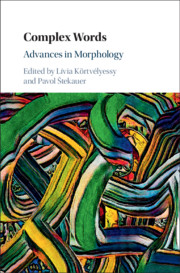Book contents
- Complex Words
- Complex Words
- Copyright page
- Dedication
- Contents
- Contributors
- Introduction: Advances in Morphology
- Part I Lexico-Semantic Aspects of Complex Words
- Part II Structure of Complex Words
- Part III Corpus-Based Case Studies
- 13 Competition between Synthetic NN Compounds and NN.gen Phrasal Nouns in Polish
- 14 An S Is an ’S, or Is It? Plural and Genitive Plural Are Not Homophonous
- 15 The Role of Word-Formation Families and Subfamilies in the Organization of German Diminutive Compounds
- 16 Semantic Patterns in Noun-to-Verb Conversion in English
- 17 Onomatopoeia
- 18 Dingsbums and Thingy
- Index
- References
18 - Dingsbums and Thingy
Placeholders for Names in German and Other Languages
from Part III - Corpus-Based Case Studies
Published online by Cambridge University Press: 18 September 2020
- Complex Words
- Complex Words
- Copyright page
- Dedication
- Contents
- Contributors
- Introduction: Advances in Morphology
- Part I Lexico-Semantic Aspects of Complex Words
- Part II Structure of Complex Words
- Part III Corpus-Based Case Studies
- 13 Competition between Synthetic NN Compounds and NN.gen Phrasal Nouns in Polish
- 14 An S Is an ’S, or Is It? Plural and Genitive Plural Are Not Homophonous
- 15 The Role of Word-Formation Families and Subfamilies in the Organization of German Diminutive Compounds
- 16 Semantic Patterns in Noun-to-Verb Conversion in English
- 17 Onomatopoeia
- 18 Dingsbums and Thingy
- Index
- References
Summary
The paper investigates placeholders, such as German Dings(bums) or English thingy. They are used in informal speech particularly for person or place names, when the speaker has forgotten them or doesn’t know them. As it turns out, in a sample of twenty-nine languages, more than half of them show only phrases or phrasal compounds of the question type (e.g. what is s/he/it called) or the deictic type (e.g. that/this). The other half use simple words or word formations, usually with a negative meaning. Compounds and derivations exist solely in Romanic and Germanic languages, however. Therefore, in a second step, I will take a closer look at placeholders in Modern German.
Keywords
- Type
- Chapter
- Information
- Complex WordsAdvances in Morphology, pp. 362 - 383Publisher: Cambridge University PressPrint publication year: 2020

